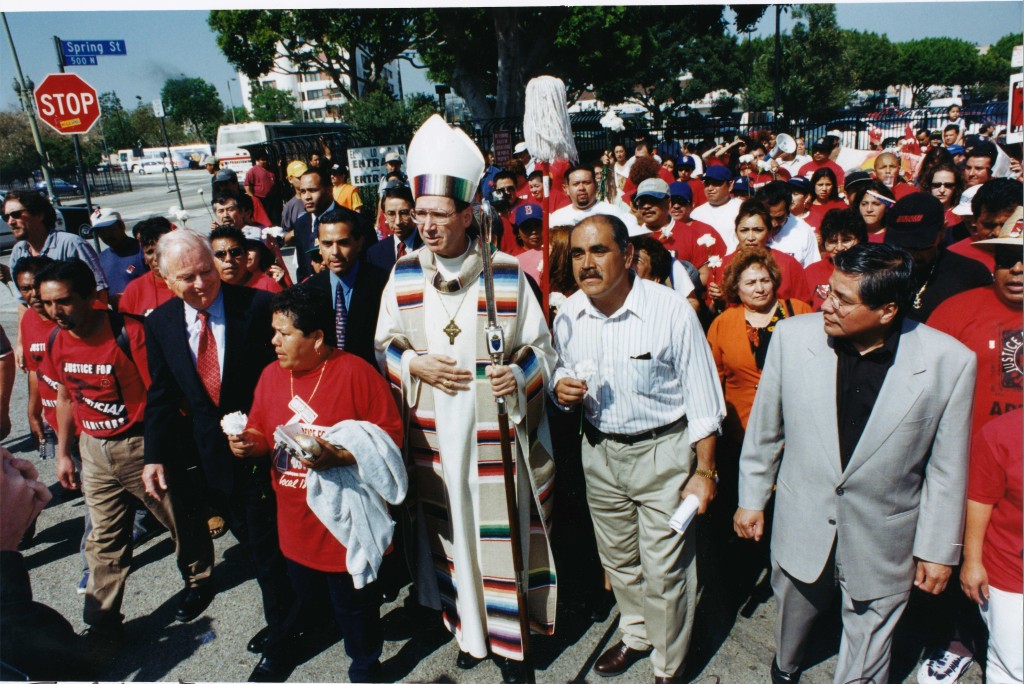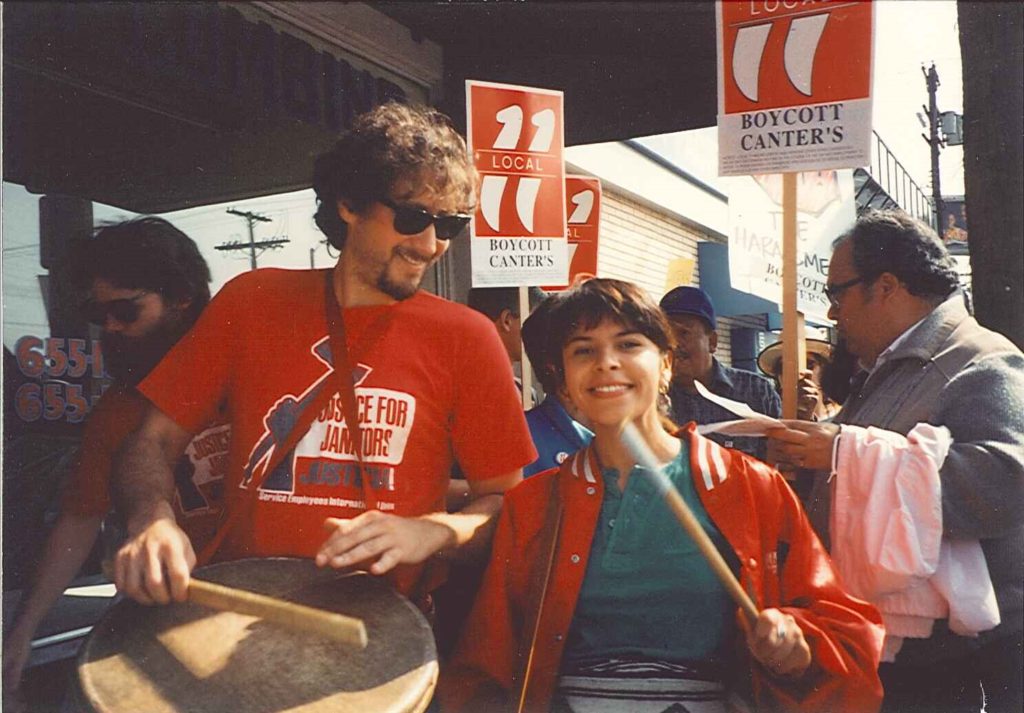In 2004, voters in the city of Inglewood rejected a ballot initiative that would have allowed retail giant WalMart to bypass the opposition of the city council to their big-box store. This documentary, narrated by a local minister, describes the unprecedented labor-community coalition that defeated the world’s largest corporation.
That stopped everything
Rosa Beltran reflects on the power of rank-and-file union members

La huelga del 2000 fue una victoria— Yo estaba fuera de mi edificio piqueteando 24 horas seguidas, 24 horas deteniendo, durmiendo, pegado a los containers de basura porque como Uniones, si la Unión de los basureros miraba un janitor que estaba piqueteando, se respetaba eso. El UPS [United Parcel Service] si miraba a alguien piqueteando, respetaba eso. El correo, si miraba a alguien, no había movimiento de nada. Ahí se detenía todo; pero si no había nadie, es por eso que le digo yo de qué sirve tener un sindicato con ejecutivos con buenas ideas, si soldados no habemos. Porque los soldados somos los que llevamos a cabo todo, al final del día. Ésa es la representación que nosotros tenemos.
The strike of 2000 was a victory— I was outside my building picketing 24 hours in a row, resting and even sleeping by the dumpsters because the unions, if the sanitation workers saw a janitor who was picketing, they respected that. If UPS saw someone picketing, they respected that. The postal workers, if they saw someone, nothing moved. That stopped everything; but if there had been no one there, that is why I say what good is it having leaders with good ideas, if you don’t have soldiers. Because at the end of the day the soldiers are the ones that carry it all. That is the representation we have.
From the interview of Rosa Beltran by Andrew Gomez.
Una Causa Justa | A Just Cause
This editorial from La Opinion reflects the widespread support for the Justice for Janitors campaign in the Spanish-speaking community of Los Angeles. The writer argues that the janitors' demands are modest, and that their aggressive campaign reflects a broad dissatisfaction with the power structure in LA. Translated from Spanish by Stephanie Dyer.
A Just Cause, La Opinion, April 6, 2000

Janitors, those informal workers who are responsible for the cleaning of the nation’s skyscrapers and buildings, carry out a tough job that is generally nocturnal and poorly compensated. The majority of them are immigrants, some undocumented, with families that depend – often entirely – on their meager income. They perform a humble job that is little known but important. Every morning, when millions of office workers and professionals report to their jobs to start their workday, the janitors have already fulfilled their duty. The offices, the hallways, and the restrooms are ready so that the world of production continues to function flawlessly.
This week, the Los Angeles janitors, who are among the lowest paid in the country but have also woven an effective organization over the years to defend their interests, made the decision to resort to a strike to demand fairer wages. This is an extreme measure, certainly, but so is their situation. Even representatives of the companies they work for recognize that these workers’ wages are outdated in comparison to wage realities in Los Angeles.
As known, this is one of the most expensive areas to live in America. But it is, at the same time, one of the most privileged, especially in these times of rampant prosperity. Corporate profits have climbed to dizzying heights, but the janitors and other workers have to fight with wages that are barely above the minimum, with which one can hardly survive. There is enough wealth in California for those who clean offices to have a decent, basic wage that permits them a dignified life and resources to educate their children. This has been recognized by the county Board of Supervisors and by several local officials who have declared their sympathy for the strikers, whose latest crusade has radiated from downtown Los Angeles to cities such as Burbank, Glendale, Beverly Hills, El Segundo and Woodland Hills.
The janitors’ claim is not limited only to the interests of their labor union. In reality, the red and black banners that call for justice and have begun to rise proudly as of Monday, speak equally for other sectors that also work hard and that, like the janitors, still await the success that is boasted about so much to arrive where they are.
Translation by Stephanie Dyar
Original text: http://proquest.umi.com/pqdweb?did=493361091&Fmt=3&clientId=1564&RQT=309&VName=PQD
We call each other sister unions
Rocio Sáenz recalls the spirit of solidarity among unions in the early 1990s
I come from Mexico City, and I had a union there. Even though, looking back at the unions in Mexico, they were often very corrupt, at the time I thought it was better than nothing. When I came to the U.S., I did a lot of different jobs. I was a domestic worker, I was a salesperson in a store, and stuff like that. But I wanted to be in a unionized workplace, and so I was trying to get a job through a local union. I didn’t know that there was such a thing as being an organizer, but I was making posters and banners for he ILGWU. A few months later, I met someone in Local 11 of HERE and they hired me. Even then, for a few months, I didn’t do organizing. I didn’t even know what it was. But then I got very involved.
I saw a different way to organize [in HERE]. To bring the trust back from the members, and to show that this was a different union. In any organizing drive, you have to show the workers that, yes, you can make a difference. Little victories that you have to deliver, in order to say there is a change. It has to be very, very specific and concrete. And you have to see things as industry-wide. When I was with HERE I remember organizing my first hotel, reorganizing it for the first time in then years. That was in Manhattan Beach, close to the airport. We did it through elections. Well we organized 300 workers, and that was not going to make a big difference for the industry. You have to look at the whole industry, instead of one single work site. You have to do it in a market competitive way. If you’re going to organize, it has to be like all of downtown L.A. has got to go union. It has to be a long-term plan It takes a lot of effort, a lot of persistence, and a lot of resources.

“You’ve got to keep the heat on in different ways, and you’ve got to be very unpredictable
— Rocio Sáenz
Let Justice Roll Down
The Working Poor: Challenge to the Religious Community
What is the responsibility of people of faith when confronted with the poverty of working people in a wealthy country? That question is posed by Clergy and Laity United for Economic Justice (CLUE) in this 2000 video featuring the testimony of working people, faith leaders, academics, and activists. Speakers include Kent Wong, Maria Elena Durazo, Madeline Janis-Aparicio, Richard Gillett, Anthony Thigpen, and others. The film concludes with a message from Rev. James M. Lawson, Jr.: “When we allow millions and millions of people in this country to work for nothing, we deprive them of their basic dignity, we commit mayhem against them. Jesus of Nazareth said, ‘The laborer deserves his wages.’ The church cannot be the church unless we get into the marketplace and insist that work is dignity, and that every employee, every worker deserves those benefits that enables them to indeed attain an abundant life that is full of the riches spiritual as well as the riches of bread.” (En Español)
